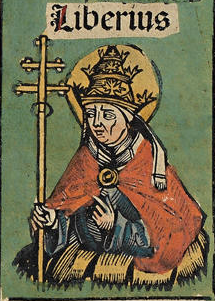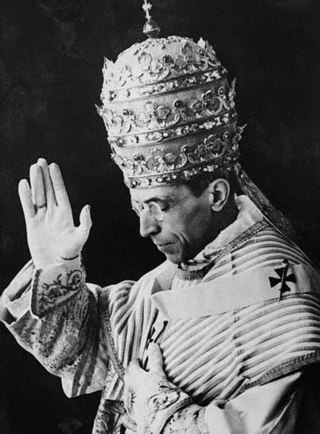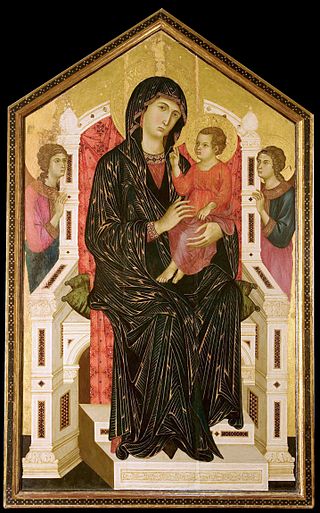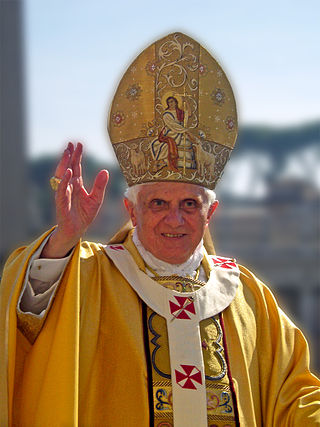
Pope Liberius was the bishop of Rome from 17 May 352 until his death. According to the Catalogus Liberianus, he was consecrated on 22 May as the successor to Julius I. He is not mentioned as a saint in the Roman Martyrology. That makes him the earliest pontiff not to be venerated as a saint in the Catholic Church and, along with Anastasius II, one of only two popes to be omitted from Catholic sainthood in the first 500 years of church history.

Pope Benedict XV, born Giacomo Paolo Giovanni Battista della Chiesa, was head of the Catholic Church from 1914 until his death in January 1922. His pontificate was largely overshadowed by World War I and its political, social, and humanitarian consequences in Europe.

Pope Pius XI, born Ambrogio Damiano Achille Ratti, was the Bishop of Rome and head of the Catholic Church from 6 February 1922 to 10 February 1939. He also became the first sovereign of the Vatican City State upon its creation as an independent state on 11 February 1929. He remained pope until his death in February 1939.
Catholic social teaching (CST) is an area of Catholic doctrine which is concerned with human dignity and the common good in society. It addresses oppression, the role of the state, subsidiarity, social organization, social justice, and wealth distribution. CST's foundations are considered to have been laid by Pope Leo XIII's 1891 encyclical, Rerum novarum, which advocated distributism. Its roots can be traced to Catholic theologians such as Thomas Aquinas and Augustine of Hippo. CST is also derived from the Bible and cultures of the ancient Near East.
The history of the Catholic Church is integral to the history of Christianity as a whole. It is also, according to church historian Mark A. Noll, the "world's oldest continuously functioning international institution." This article covers a period of just under two thousand years.
Pacem in terris is a papal encyclical issued by Pope John XXIII on 11 April 1963, on the rights and obligations of people and their states, as well as proper interstate relations. It emphasizes human dignity and human equality in endorsing women's rights, nuclear nonproliferation and the United Nations.
Humani generis redemptionem is an encyclical by Pope Benedict XV given at St. Peter's, Rome, on 15 June, the Feast of the Sacred Heart of Jesus in the year 1917, in the third of his Pontificate. The encyclical points to an ever-increasing number of Christian preachers and an ever-decreasing effect of their preaching. He admonished bishops to be preachers first of all, and to be more careful in the selection of preachers and confessors, for whom Humani generis redemptionem prescribed basic preconditions.

Summi Pontificatus is an encyclical of Pope Pius XII published on 20 October 1939. The encyclical is subtitled "on the unity of human society". It was the first encyclical of Pius XII and was seen as setting a tone for his papacy. It criticizes what it saw as major errors of the time, such as ideologies of racism, cultural superiority, and the totalitarian state. It also sets the theological framework for future encyclical letters such as Mystici corporis Christi (1943). The encyclical laments the occupation of Poland, denounces the Molotov–Ribbentrop Pact, and calls for a restoration of independent Poland.
Ad Apostolorum principis is an encyclical of Pope Pius XII on Communism and the Church in China. It describes systematic persecutions of bishops, priests, religious and faithful and the attempts of the government to establish a patriotic Catholic Church, independent of Rome.

The Mariology of the popes is the theological study of the influence that the popes have had on the development, formulation and transformation of the Roman Catholic Church's doctrines and devotions relating to the Blessed Virgin Mary.

Mariological papal documents have been a major force that has shaped Roman Catholic Mariology over the centuries. Mariology is developed by theologians on the basis not only of Scripture and Tradition but also of the sensus fidei of the faithful as a whole, "from the bishops to the last of the faithful", and papal documents have recorded those developments, defining Marian dogmas, spreading doctrines and encouraging devotions within the Catholic Church.

Le pèlerinage de Lourdes is the only encyclical of Pope Pius XII issued in French. It includes warnings against materialism on the centenary of the apparitions at Lourdes. It was given at Rome, from St. Peter's Basilica, on the feast of the Visitation of the Most Holy Virgin, July 2, 1957, the nineteenth year of his pontificate.
Quod iam diu was an encyclical of Pope Benedict XV, given at Rome at St. Peter's on December 1, 1918, the fifth year of his Pontificate. It requests all Catholics everywhere in the world, no matter which side they were on, to pray for a lasting peace and for those who are entrusted to make it during the peace negotiations.
Summi maeroris is one of several peace encyclicals of Pope Pius XII focusing in particular on the dangers to peace during the Holy Year. It was given at Rome, at St. Peter's on July 19, 1950, the twelfth year of his Pontificate.
Maximum illud is an apostolic letter issued by Pope Benedict XV on 30 November 1919. As is traditional with such documents, it takes its title from the opening words of the original Latin text, meaning "that momentous". Benedict begins by recalling "that momentous and holy charge" found in Mark 16:15: "Go into the whole world and preach the gospel to all creation."
Apostolorum may refer to:

Caritas in veritate is the third and last encyclical of Pope Benedict XVI, and his only social encyclical. It was signed on 29 June 2009 and was published on 7 July 2009. It was initially published in Italian, English, French, German, Polish, Portuguese, and Spanish.

Holy See–Soviet Union relations were marked by long-standing ideological disagreements between the Catholic Church and the Soviet Union. The Holy See attempted to enter in a pragmatic dialogue with Soviet leaders during the papacies of John XXIII and Paul VI. In the 1990s, Pope John Paul II's diplomatic policies were cited as one of the principal factors that led to the dissolution of the Soviet Union.
The relations between Pope Benedict XV and Judaism were marked by two significant historical events: the emigration of Eastern European Jewish communities due to World War I and to pogroms, and the development of Zionism in the Middle East and its effects on local Levantine, Greek-Catholic and Arab Christian communities.
In praeclara summorum is the eleventh encyclical of Pope Benedict XV, published on 30 April 1921, for the occasion of the sixth centenary of the death of Dante and is dedicated to the memory of the poet.








